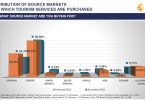LONDON, England – Hotel prices have experienced pronounced volatility as a result of political turmoil and natural disasters in the first half of 2011, according to the latest Hotel Price Index.
The average price of a room around the world rose by just 3% in the first six months of the year but this masked some steep rises and falls in regions affected by the historic events.
Other factors such as currency strength and supply of rooms also impacted average room prices across the world, although the report shows that overall these were just 6% higher than when the HPI was launched in 2004, representing outstanding value for travellers.
Prices fell 6% in Asia Pacific year-on-year but rose in all other areas: 4% in North America, 2% in Europe and Latin America and 1% in the Caribbean.
Counting the cost of the Arab Spring
The uprisings which occurred in North Africa and the Middle East triggered substantial reductions in hotel prices across the region as tourists and business travellers stayed away not only from countries directly hit by the civil unrest but also from those which escaped political protest.
However, the fall in consumer confidence was good news for destinations in southern Europe as travellers returned to more traditional havens. The rising demand pushed up prices in some Spanish sunshine destinations and the overall HPI for Europe rose 2% compared with the first half of last year.
Ireland was also helped by the high-profile visits of Queen Elizabeth II and President Obama which triggered a slight market recovery in hotel prices by attracting visitors and boosting demand.
Japanese earthquake hits prices in Asia Pacific
Average prices for hotel rooms across Asia Pacific fell by 6% over the period. The Japanese earthquake, tsunami and nuclear crisis at Fukushima led to reduced occupancy and falling demand in the country and also had a knock-on effect in other parts of the region as the Japanese chose to stay close to home.
However, despite the downward price pressures, there were also some marked rises in the region, especially in strong economies such as Australia where corporate travel continued strongly and the Australian Dollar remained high.
Travellers from economic powerhouses enjoy lower hotel rates
This factor was also evident in other countries with strong currencies and economies and meant citizens from nations such as Brazil, Sweden and Switzerland benefited from lower prices in many destinations, particularly the US and UK where the US Dollar and Pound Sterling struggled to hold their ground.
David Roche, President of Hotels.com, comments: “This year, for the first time, dramatic political and natural world events, such as the Japanese earthquake and Arab Spring, have caused the most pronounced level of hotel price volatility since we began this report in 2004.
“However, despite some exceptional price movements, it is important to highlight that overall the picture has been one of gradual recovery with many room rates still on a par with what they were seven years ago, representing great value for the traveller.
“Of course, other factors such foreign exchange fluctuations, one-off political sporting, cultural or trade events and discounting by hoteliers can also influence prices but it’s important to underline the general health of the sector so far this year.
“This can be seen by the growth in the supply of rooms all over the world with nearly 6,000* hotel projects in development. This increase in accommodation also acts as a brake on prices and, once again, is good news for the consumer.”
(eTN): World events lead to dramatic swings in hotel prices | re-post license | post content






















